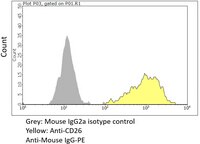MABS2291-25UL Sigma-AldrichAnti-DPP4/CD26 Antibody, clone KU44.13A
This Anti-DPP4/CD26, clone KU44.13A, Cat. No. MABS2291, is a mouse monoclonal antibody that detects DPP4/CD26 and is tested for use in ELISA, Flow Cytometry, Immunofluorescence, Immunohistochemistry, and Immunoprecipitation.
More>> This Anti-DPP4/CD26, clone KU44.13A, Cat. No. MABS2291, is a mouse monoclonal antibody that detects DPP4/CD26 and is tested for use in ELISA, Flow Cytometry, Immunofluorescence, Immunohistochemistry, and Immunoprecipitation. Less<<Recommended Products
Overview
| Replacement Information |
|---|
| References |
|---|
| Product Information | |
|---|---|
| Format | Purified |
| Presentation | Purified mouse monoclonal antibody IgG2a in buffer containing 0.1 M Tris-Glycine (pH 7.4), 150 mM NaCl with 0.05% sodium azide. |
| Quality Level | MQ200 |
| Physicochemical Information |
|---|
| Dimensions |
|---|
| Materials Information |
|---|
| Toxicological Information |
|---|
| Safety Information according to GHS |
|---|
| Safety Information |
|---|
| Storage and Shipping Information | |
|---|---|
| Storage Conditions | Recommend storage at +2°C to +8°C. For long term storage antibodies can be kept at -20°C. Avoid repeated freeze-thaws. |
| Packaging Information | |
|---|---|
| Material Size | 25 µL |
| Transport Information |
|---|
| Supplemental Information |
|---|
| Specifications |
|---|
| Global Trade Item Number | |
|---|---|
| Catalogue Number | GTIN |
| MABS2291-25UL | 04065267027654 |
Documentation
Anti-DPP4/CD26 Antibody, clone KU44.13A SDS
| Title |
|---|
Anti-DPP4/CD26 Antibody, clone KU44.13A Certificates of Analysis
| Title | Lot Number |
|---|---|
| Anti-DPP4/CD26, clone KU44.13A - Q3758866 | Q3758866 |







